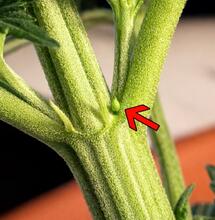Can Cannabis Use Trigger Epigenetic Changes?

The use of cannabis, both recent and prolonged consumption, may have implications on the epigenome. What does that mean? The epigenome functions in a way that it activates and deactivates genes to change the way our bodies work. Cannabis can alter gene expression. Learn more about the recent research in which scientists have found some interesting associations between cannabis use and epigenetic changes.
What is the Epigenome?
Epigenome, in simple words, refers to any chemical modifications made to DNA and associated proteins that influence how genes function. Epigenetics, therefore, is the study of how external factors, such as the environment where you live or products consumed, may have an altering effect on your genes. To be clear, this is very different from genetic changes (or mutations); epigenetics are reversible and do not change DNA sequencing, but they can alter the ways in which the body interprets your DNA. In some cases, this may have health implications, although no such implications have been established for cannabis use yet.
What Scientists Know About Cannabis Use and Epigenetics?
Investigations into cannabis use and epigenetics are rare. But, according to one recent study, it is suggested that the habitual use of cannabis can cause epigenetic changes in the human body. Further research is needed to explain potential long-term health consequences, if any, among cannabis users.
One of the main reasons why scientists want to study the possible connections between cannabis and the epigenome is its increased accessibility with the ongoing legalization. “Despite its growing popularity, as well as recent legalization by several states, the effect of marijuana on epigenetic factors has not been well studied,” said Lifang Hou, one of the senior researchers in the study.
The study included 900 participants and it detected several epigenetic changes related to the use of cannabis. The research effort followed after scientists pinpointed DNA associations between cannabis use and the aging process. “We wanted to further explore whether specific epigenetic factors were associated with marijuana and whether these factors are related to health outcomes,” added Hou, who is a medical doctor and epidemiologist from Northwestern University Feinberg School of Medicine.
The Study Identified Multiple Epigenetic Changes Due to Cannabis Use
The study investigated blood samples taken five years apart from over 900 adults. The samples were provided through the CARDIA cohort group, which is an ongoing study that tracks the cardiovascular health of 5,000 individuals who were aged between 18 and 30 years old back in 1985 and 1986.
The CARDIA participants have been asked about their cannabis use during different check-up sessions throughout the years. They have been asked if they consume marijuana and how often they use it. The epigenetic-centered study has focused on those participants who have answered positively about cannabis use. Looking at each participant’s recent cannabis consumption and estimated cumulative use, Hou’s team performed DNA methylation profiling on retrieved blood samples.
DNA methylation is a process that can reveal all and any changes in the epigenome. Both environmental and lifestyle factors can prompt methylation changes, which does not affect the genomic sequence of the DNA, but it does change the activity of the genes. As a result, future generations may inherit those traits.
The Northwestern University research team was able to observe multiple associations between cumulative cannabis use and various epigenetic markers over time. Some of the identified markers in question concern cell proliferation (cell division and growth), infection, and psychiatric disorders. However, it is also important to mention that the research does not establish any ‘casual relationship’ between cannabis use and changes in the epigenome.
Marijuana and Tobacco Might Have Shared Epigenetic Regulation
DNA methylation markers associated with recent and long-term cannabis use were traced in both older and newer blood samples taken for screening. The team detected 132 markers linked to recent use and 16 linked to cumulative marijuana use in the blood samples from the 20-year check-up in the CARDIA study; similar results were observed in the 15-year samples.
“Interestingly, we consistently identified one marker that has previously been associated with tobacco use, suggesting a potential shared epigenetic regulation between tobacco and marijuana use,” Hou said. “The observed marijuana markers were also associated with cell proliferation, infection and psychiatric disorders, however, additional studies are needed to replicate and verify these findings,” she added.
Another researcher on the team and paper author, Drew Nannini, further implied that there’s no connection between the cannabis-related epigenetic changes and observed health outcomes in the study participants. “To determine if these associations are consistently observed in different population groups would require more research,” Nannini said.
The study has been published in the journal Molecular Psychiatry. Researchers recommend conducting further studies that will examine the use of cannabis on age-related health outcomes and the long-term influence of cannabis on health.
More from Soft Secrets:











